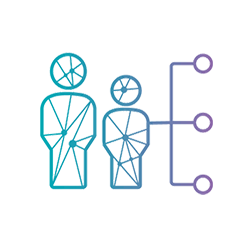Blogs, News and Case Studies

Soft skills are typically those gained through experience – so how can you make sure that your younger employees have them?
Why do soft skills matter?
Soft skills, also known as interpersonal skills or people skills, are non-technical skills that relate to how you work with others, communicate and navigate your environment. Unlike hard skills, which are typically more technical and can be easily taught, soft skills are more subjective and are often related to personality traits and emotional intelligence.
So why do they matter? Well, they're the personal qualities and habits that make your employees great at working with others, solving problems and handling tricky situations. When someone has strong soft skills, they're better at talking to coworkers, sharing ideas and making sure everyone feels heard. That means your projects get delivered more smoothly, with fewer misunderstandings and conflicts. Plus, when things inevitably get tough, employees with good soft skills can handle it calmly and find solutions.
Soft skills also make a big difference in how your employees treat your customers. When your employees have empathy and patience, they can understand what your customers need and help them feel valued. That keeps people coming back and recommending your company to others.
What are soft skills?
Examples of soft skills include:
1. Communication: This includes verbal communication, written communication, active listening and the ability to articulate ideas clearly and effectively
2. Teamwork: The ability to work collaboratively with others, contribute to group efforts and resolve conflicts
3. Leadership: The capacity to motivate, inspire and guide others toward achieving common goals
4. Adaptability: Being able to adjust to new situations, environments, or unexpected changes with flexibility and a positive attitude
5. Problem-solving: The skill to analyse issues, generate creative solutions and make informed decisions
6. Time management: Effectively managing your time and prioritising tasks to maximise productivity and meet deadlines
7. Emotional intelligence: The ability to recognise, understand and manage your own emotions, as well as to empathise with others and navigate social interactions effectively
8. Critical thinking: The capacity to objectively evaluate information, consider different perspectives and make reasoned judgments
9. Conflict resolution: The ability to identify sources of conflict, facilitate constructive communication and negotiate mutually beneficial solutions
10. Networking: Building and maintaining relationships with others in personal and professional contexts to exchange information, support and opportunities.
Soft skills are essential in almost every aspect of life, including the workplace, education, relationships, and personal development. They complement technical skills and are often what distinguish outstanding performers in their respective fields.
How can your young employees develop their soft skills?
An apprenticeship is an excellent opportunity to develop and enhance soft skills in several ways:
On-the-job training: Apprenticeships typically involve learning while working alongside experienced professionals. This hands-on experience allows apprentices to observe and emulate soft skills in action, such as communication, teamwork, and problem-solving.
Mentorship: Total People apprenticeship programs pair apprentices with learning coaches who provide guidance, support, and feedback throughout the learning process. Learning coaches can help apprentices develop their soft skills by modelling behaviours, offering advice and providing opportunities for practice and reflection.
Real-world challenges: Apprenticeships often involve working on real-world projects and tasks, which can present opportunities to develop and apply soft skills in a practical context. Apprentices may need to collaborate with colleagues, communicate with clients, or adapt to changing circumstances, all of which require strong soft skills.
Structured learning: While most apprenticeships primarily focus on gaining practical experience, at Total People soft skills are embedded into the knowledge and behaviours that are taught as part of our curriculum.
Feedback and evaluation: Our apprenticeships involve regular feedback and evaluation from tutors, learning coaches and colleagues. This feedback can help apprentices identify areas for improvement in their soft skills and tailor their development efforts accordingly.
Networking opportunities: Apprenticeships provide opportunities to interact with a diverse range of professionals within the industry. Building relationships with coworkers, clients and industry contacts helps apprentices strengthen soft skills such as networking, relationship-building and interpersonal communication.
Overall, apprenticeships offer a holistic learning experience that can significantly contribute to the development of both technical knowledge and soft skills. By combining practical experience with structured learning and mentorship, apprenticeships provide a valuable opportunity for individuals to enhance their interpersonal, communication, and problem-solving skills in a real-world setting.
For more information on setting your employees on an apprenticeship path visit our employer page or call our friendly advisers on 03333 222 666.




